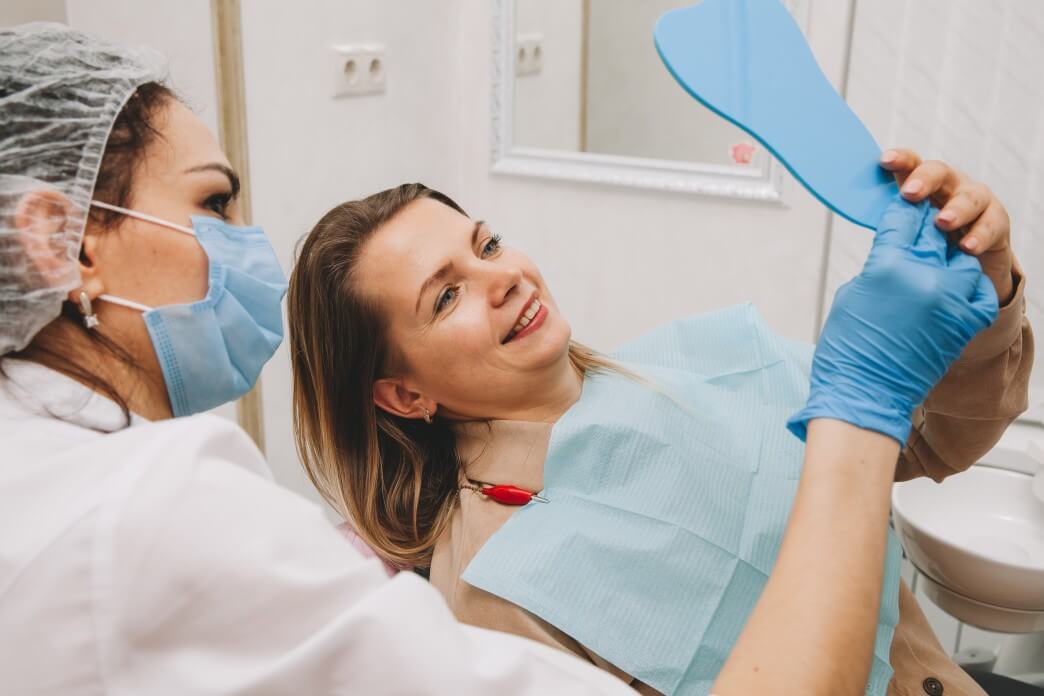Mental Health
How to Relax in The Dentist Chair & Calm Dental Anxiety

Nobody really ever enjoys going to the dentist but for some people, it can cause intense anxiety and nervousness. In fact, about 36% of people experience dental anxiety, so if you thought you were the only one, guess again!
Thankfully there are some ways you can calm your nerves and relax (even if just barely) at your next dentist appointment.
[elementor-template id=”2705″]
1. Breathing Exercises
If you’re like most people, you tend to hold your breath or breathe shallowly when you’re nervous. But according to this article from Forbes, this just makes your anxiety worse. Next time you’re in the dentist’s chair, try some easy breathing exercises to calm your nerves.
For example, breath counting is an effective breathing exercise and can be done in the dentist’s chair.
To do breath counting, you’ll sit in a comfortable position and start by closing your eyes and taking a few deep breaths.
Then you’ll breathe normally and mentally count at each exhale, up to 5 counts. Repeat as long as you need. Keeping it to 5 counts allows you to refocus on your breaths and not on your anxious thoughts.
2. Visualization and Guided Imagery
Visualization and guided imagery are relaxation techniques that help you imagine yourself being in a different state to reduce stress at that moment. In other words, it’s going to your happy place.
To use visualization as a way to calm down in the dentist chair, simply close your eyes and imagine yourself in a different environment, such as the beach.
For guided imagery, focus on the way the waves swish back and forth, and the sound of the birds in the sky. Think about how the sand feels on your feet and the smell of the air. Try to engage all your senses and allow yourself to fully relax.
There are many guided imagery resources available, so you may want to explore which ones you prefer before your appointment.
3. Meditation and Mindfulness Apps
Using a meditation or mindfulness app is another way to relax next time you’re sitting in the dentist’s chair. These work in a similar way to guided imagery and both have stress-relieving benefits.
When meditating, you focus on something like your breathing, an object, or a sensation – and continue to bring your attention back to that single thing.
Some meditation and mindfulness apps have different functionalities than others, so it’s best to explore different meditation apps before your appointment so you know which one you want to use when the time comes.
4. Aromatherapy
Aromatherapy is great at reducing stress and helping you to relax no matter where you are. One of the easiest ways to benefit from aromatherapy is to use essential oils for stress relief.
You can use them on diffuser bracelets or earrings, which have beads or clay that soak in the essential oil and slowly release the oils throughout the day.
Another option is to use them topically, whether on their own or in a stress-relieving lotion. Just make sure that the oil you use is safe to use on the skin and has been diluted as needed.

5. Relaxing Sounds (Music, White Noise, or ASMR)
Listening to relaxing sounds is also incredibly soothing, whether it’s your favorite music, white noise, or ASMR.
Most dentists don’t mind patients having a pair of headphones in for the visit, so create a playlist of relaxing songs and sounds before your appointment.
Each option relaxes your nervous system in different ways, but the benefit of reducing anxiety is the same.
If you’re not used to one of these methods, consider exploring it anyway. It may end up being more helpful than other common stress coping techniques that you’ve used before.
For example, ASMR is still relatively new and is being studied, but it’s been proven to relieve stress and promote a deep state of relaxation.
6. Distract Your Brain
The worst thing that you can do in a dentist’s chair is to dwell on the worst-case scenarios that feed your anxiety. You can combat this by intentionally distracting yourself with exciting or calming thoughts.
Here are some things you can think of to keep your mind off of what’s going on:
- Your next home project
- Your plans for the rest of the day
- What you’ll have for lunch or dinner
- An event you’re planning
- Something upcoming that you’re excited about

7. Small Comforts and Fidgets
Having something small to fidget with or touch can make you feel safer and more comfortable.
Do you have an object that you gravitate towards in stressful environments or even something like a lucky penny?
If so, bring that along to your dentist appointment and hold onto it or think about it when you’re feeling anxious.
Some examples of small comforts and fidgets that can help you feel safer and more in control are:
- A lucky object
- Hair tie, bracelet, keychain, or ring to fidget with
- Wearing a long sleeve shirt to pull on
- A soft scarf or jacket
- Stress ball
- Bubble Popper
8. Bring a Comforting Friend
If you have someone in your life who helps you feel more relaxed and safe, ask them if they can tag along with you at your next appointment.
Some dentists allow a second person in the room while others ask that they stay in the waiting room, but even knowing that you have someone waiting for you can be comforting.
This also gives you something to look forward to and focus on throughout your appointment.
Another way to relieve pent-up anxiety is by discussing it with the person if they are open to it.
### Other Tips for Dealing with Dental Anxiety
While the strategies mentioned above can help you relax in the dentist’s chair, there are additional ways to manage your anxiety before and after your appointment.
#### Find an Anxiety-Conscious Dentist
A good dentist will understand that patients may have varying levels of anxiety about dental visits and will be accommodating. Look for a dentist’s office that is friendly, knowledgeable, and empathetic towards dental anxieties. They may offer options such as numbing gels, oral sedation, nitrous oxide, IV sedation, hand warmers, white noise, shaded glasses, and aromatherapy to help anxious patients feel more comfortable.
#### Be Honest with Your Dentist
Openly communicating your anxiety and concerns with the dental staff can be beneficial. This allows them to understand your needs as a patient and provide personalized solutions, such as establishing a signal for when you need a break or taking breaks at specified intervals. You can also request your dentist to explain procedures or opt to not receive explanations based on your preferences.
#### Schedule an Appointment at the Right Time
Choosing a time that works best for you can help alleviate anxiety. Some individuals find early appointments less stressful as it doesn’t linger on their mind, while others may prefer later appointments.
#### Watch Dental Videos for Preparation
If you like to be prepared, watching dental videos before your appointment can help ease anxiety by familiarizing yourself with the process. This may boost your confidence and reduce fears by witnessing successful dental experiences.
### Overcoming Dental Anxiety
It’s common to feel anxious or fearful about dental visits, but it is possible to manage these feelings. If the tips provided are insufficient and your oral health is impacted by stress, consider seeking therapy. Online therapy platforms like Talkspace offer convenient and less intimidating options for addressing anxiety. Remember, prioritizing your health includes overcoming dental anxiety for better oral care.
-

 Destination7 months ago
Destination7 months agoSingapore Airlines CEO set to join board of Air India, BA News, BA
-

 Breaking News8 months ago
Breaking News8 months agoCroatia to reintroduce compulsory military draft as regional tensions soar
-

 Tech News11 months ago
Tech News11 months agoBangladeshi police agents accused of selling citizens’ personal information on Telegram
-

 Breaking News8 months ago
Breaking News8 months agoBangladesh crisis: Refaat Ahmed sworn in as Bangladesh’s new chief justice
-

 Guides & Tips9 months ago
Guides & Tips9 months agoHave Unlimited Korean Food at MANY Unlimited Topokki!
-

 Gaming8 months ago
Gaming8 months agoThe Criterion Collection announces November 2024 releases, Seven Samurai 4K and more
-

 Toys10 months ago
Toys10 months ago15 of the Best Trike & Tricycles Mums Recommend
-

 Tech News9 months ago
Tech News9 months agoSoccer team’s drone at center of Paris Olympics spying scandal
























